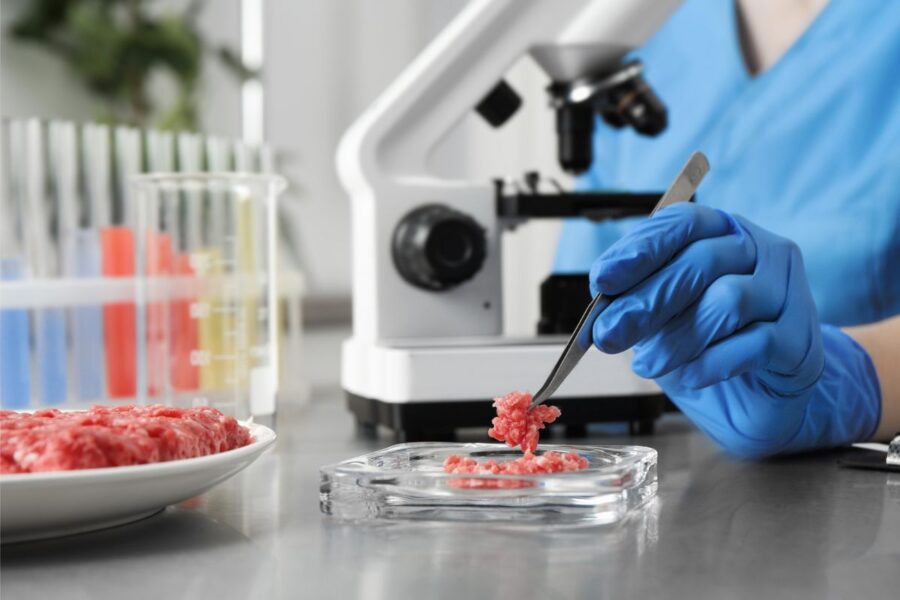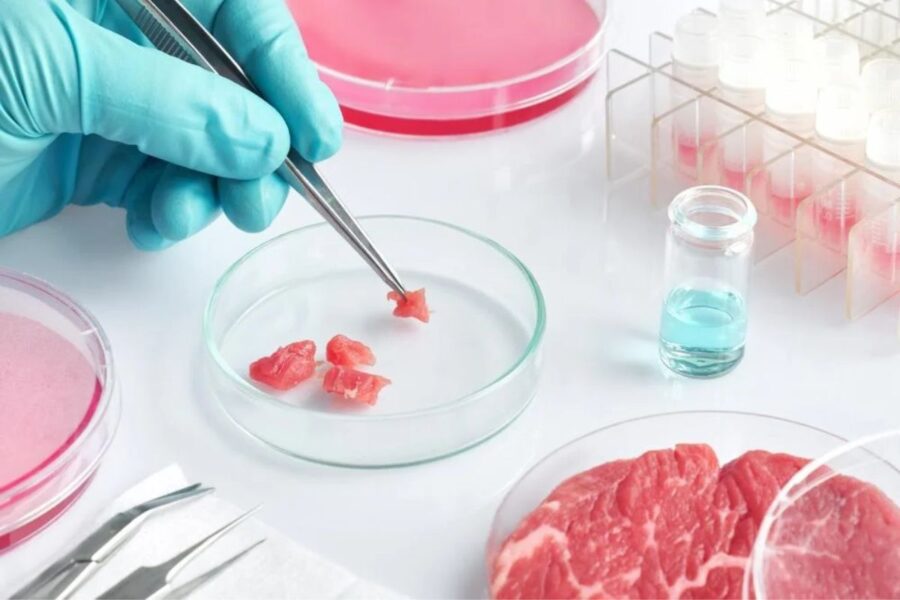Senate Approves Ban on Lab-Grown Meat: The recent approval by the Senate to ban lab-grown meat has sparked a contentious debate among lawmakers, scientists, and consumers alike. With Alabama passing a bill criminalizing the sale of such products, questions arise regarding the future of food production and the role of innovation in agriculture.
As critics and supporters voice their concerns, the implications of this decision on the economy, environment, and ethical considerations continue to linger, prompting a deeper examination of the complexities surrounding this issue.
Key Takeaways
- Senate Bill 23 aims to regulate lab-grown meat sales.
- Alabama’s Senator Williams opposes lab-grown meat consumption.
- Focus on protecting local farmers and traditional farming practices.
- Debate on consumer choice, safety, and sustainability of lab-grown meat.
Alabama Senate Passes Bill Criminalizing Sale of Lab-Grown Meat
The Alabama Senate’s recent passage of Senate Bill 23, proposed by Senator Jack Williams of Mobile, marks a significant step towards criminalizing the sale of meat derived from lab-grown cultured animal cells. This legislative move has sparked a debate pitting technological advancement against traditional agricultural practices.
Proponents of the bill argue that labeling and selling lab-grown meat as traditional meat is misleading to consumers and poses potential health risks due to the lack of regulatory oversight in this emerging industry. On the other hand, supporters of cultivated meat highlight its potential for sustainability, animal welfare, and decreased environmental impact compared to conventional livestock farming.
The decision to criminalize the sale of lab-grown meat in Alabama reflects broader societal concerns about food transparency, safety, and ethics. As this bill progresses, it is crucial for policymakers to carefully consider the implications of regulating this innovative food technology on both the economy and consumer choices.
Overview of Senate Bill 23 and Cultivated Meat
Addressing the regulation of cultivated meat, Senate Bill 23 focuses on the sale and distribution of products derived from lab-grown animal cells. This bill specifically targets the emerging industry of cultivated meat, which involves the production of meat in laboratories using animal cells, eliminating the need for traditional animal farming practices.
By honing in on the sale and distribution aspects, the bill seeks to establish guidelines for the commercialization of these innovative products. The introduction of Senate Bill 23 reflects the ongoing debate and growing interest in the acceptance and oversight of lab-grown meat within the food industry.
As technology continues to advance, the legislation aims to navigate the complexities surrounding the production and consumption of cultivated meat, ensuring that standards are in place to safeguard consumer interests and promote transparency within the market. Senate Bill 23 underscores the significance of adapting regulatory frameworks to accommodate the evolving landscape of food production and consumption.
Regulatory Context and Previous Approvals
In light of recent regulatory developments and prior approvals in the cultivated meat industry, notable progress has been made towards establishing clear guidelines for the commercialization of lab-grown meat products. Last year, U.S. regulators sanctioned the sale of chicken derived from animal cells, marking a significant milestone in the acceptance of lab-grown meat. This decision allowed select companies in California to introduce ‘lab-grown’ meat into the market, signaling a shift in the traditional meat industry. The Associated Press highlighted how technological advancements have paved the way for alternative methods of meat production, underscoring the potential for innovation in meeting global food demand sustainably.
These regulatory advancements are crucial steps towards ensuring the safety and quality of lab-grown meat products for consumers. By building on prior approvals and setting clear guidelines, the industry can continue to grow while maintaining high standards of production and transparency. The groundwork laid by these regulatory decisions is vital for fostering trust among consumers and stakeholders as the cultivated meat sector evolves.

ALSO READ: Alabama Senate Passes Bill for Political Board Archives Department
Farmer and Senator Jack Williams’ Perspective
Building on the recent regulatory strides in the lab-grown meat industry, Senator Jack Williams, a cattle farmer, brings a unique perspective to the debate surrounding cultivated meat. Williams, as a staunch advocate for traditional farming practices, sponsored the bill to ban lab-grown meat in Alabama. He believes that this artificial form of meat production is disconnected from the state’s rich agricultural heritage, where locally raised cattle and chicken abound. Williams argues that Alabamians should continue to support and consume products from farms within the state to uphold its agricultural traditions.
Senator Jack Williams’ Perspective:
- Emphasizes the importance of locally produced cattle and chicken in Alabama.
- Advocates for the preservation of traditional farming practices.
- Aims to prevent Alabamians from consuming cultivated meat.
Senator Williams’ stance reflects his dedication to protecting the interests of local farmers and ensuring the continuation of time-honored agricultural methods in Alabama.
Political and Agricultural Implications
With the proposed ban on lab-grown meat receiving approval in the Senate, the intersection of politics and agriculture in Alabama is poised for significant shifts. Senator Jack Williams, a farmer with aspirations for the state agriculture commissioner position, has played a crucial role in advocating for the ban to support local agricultural products and safeguard the state’s cattle industry. Current Agriculture Commissioner Rick Pate also stands behind the legislation, emphasizing the need to protect cattlemen and uphold Alabama’s agricultural economy. This move is expected to have ripple effects across the food industry, influencing local farming practices and reshaping the political landscape in Alabama as discussions around the regulation of lab-grown meat intensify.
| Political Implications | Agricultural Implications |
|---|---|
| Senator Williams’ political ambitions | Protection of local agricultural products |
| Commissioner Pate’s support for the bill | Preservation of the state’s cattle industry |
| Potential shifts in the political landscape | Impact on local farming practices |

Conclusion Of Senate Approves Ban on Lab-Grown Meat
In conclusion, the approval of Senate Bill 23 criminalizing the sale of lab-grown meat in Alabama represents a significant decision with potential political and agricultural implications. The regulatory context and previous approvals set the stage for this development, reflecting a balance between technological advancements and traditional farming practices.
Farmer and Senator Jack Williams‘ perspective adds a valuable insight into the debate surrounding cultivated meat. This decision marks a pivotal moment in the ongoing discussion of food production methods.
Our Reader’s Queries
Why is lab-grown meat bad?
The production process involves extensive antibiotic use and handling of hazardous materials. Diseases may spread within the facility or contaminate the product. Additionally, potential health and safety risks for humans consuming cultured meat remain unknown.
Are animals killed for lab-grown meat?
Individuals abstaining from meat due to animal welfare or environmental concerns might consider trying cultivated meat. Various methods, such as biopsy, fertilized egg extraction, or even feather collection, allow cell harvesting without harming the animal.
Is lab meat a real meat?
Lab-Grown Meat: Authentic Meat or Not? Yes, cultivated meat is produced from animal cells. Although not identical to living animal tissues, it shares the same materials and nearly identical structure. Essentially, lab-grown meat is genuine meat.
How do I know if meat is lab grown?
Once the products reach supermarket shelves, Chen notes, “they will feature the stamp and seal typical of meat”: a small round tag verifying USDA inspection. Labels will also bear the prefix “cell-cultured” to differentiate the meat from traditional barnyard products.

